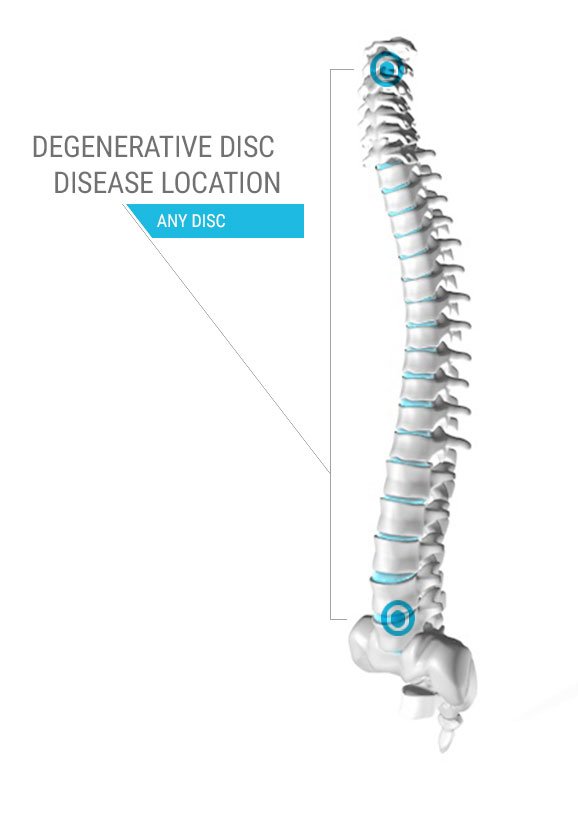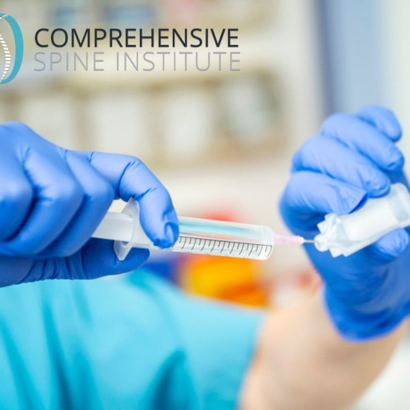
Degenerative Disc Disease Treatment in Tampa
Experienced Spine Specialists Who Can Help in St. Petersburg & Clearwater
Degenerative Disc Disease can affect the cervical, thoracic and lumbar spine, resulting in chronic or acute neck, back and/or limb pain, paresthesias or weakness. It is caused by aging, prior injury, trauma or from repetitive overuse. Not all degenerative disc disease results in pain.
Degenerative disc disease can be well managed with conservative care, appropriate exercises and pain management over a lifetime.
Following surgery, decompression at a joint to relieve pressure can be permanently effective or may require a fusion at a later time, at that level, if there is further loss of joint space and damage to nerves and soft tissue. Total disc replacements are very successful at maintaining movement and function and helping to maintain a healthy spine.

What Causes Degenerative Disc Disease?
During normal aging, the intervertebral disc loses hydration and this results in the space between the vertebral bodies and facet joints decreasing. This loss of height can result in compression of soft tissue between the joints such as nerve tissue, ligaments and changes in the joint structures.
Degeneration can also occur from injury to the spine segment such as trauma, car accidents, repetitive lifting or motion injuries as occur in sports or work environments. Degenerative changes in the body may be spontaneous and hereditary as well. Degenerative disc disease is very common in the older population, but can also occur in younger adults.
Degenerative disc disease is a progressive condition resulting in changes in the disc from bulging, to herniation to thinning of the disc resulting in bone on bone of the vertebrae and osteophyte or arthritic bone growth occurring between vertebrae.
Symptoms of Degenerative Disc Disease:
- Back Pain
- Weakness
- Numbness
- Arm Pain
- Leg Pain
- Tingling
How Is Degenerative Disc Disease Diagnosed?
Your physician may initially request an x-ray of the spine that can readily demonstrate a degenerative level as the disc height has decreased. In order to see more specific details of the soft tissue involvement, an MRI – or magnetic resonance imaging of the spine may be needed.
This will show specifically which soft tissue areas or nerves are being compromised by the degenerative changes and may help to choose the most effective treatment or surgery.
Degenerative Disc Disease Treatment
Degenerative disc disease can be well managed conservatively during the phases of deterioration and if pain free may never need further intervention. Conservative care includes physical therapy, posture control and awareness and improvement, activity pacing and avoiding compressive loading of the spine which occurs with prolonged sitting, standing, leaning over and lifting. Education on correct body mechanics and altering sport choices may be required.
Medication and epidural shots can often decrease inflammation of the soft tissues or nerves and be very effective if combined with physical therapy.
If symptoms persist then it may be necessary to offer a surgical intervention such as a spinal decompression or removal of excess bone or osteophytes and opening up the space with removal of damaged ligaments such as the ligamentum flavum.
If the degenerative changes are moderate it is possible to do a disc replacement that will maintain a healthy space and also allow the patient to keep their spinal motion and avoid compromising adjacent spinal levels.
If the degenerative changes are severe and there is minimal or no disc space remaining, a spinal fusion with an intervertebral spacer, cage or rods and screws will increase the space and maintain it, preventing further tissue or nerve damage.
Contact us today at (727) 300-2537 for more information about degenerative disc disease treatment options.
-
Minimal Wait TimeYou shouldn't have to wait a profound amount of time to see a physician we'll get you in, in two weeks or less.
-
Education Is KeyWe believe in educating our patients so they feel empowered when making decisions about their care.
-
4 Convenient LocationsWe are easily accessible with 4 locations that are able to provide the same quality of care.
-
Multi-Specialty PracticeWe pride ourselves on providing our patients with care from physicians who specialize in their needs.
The Latest In Orthopedics
-
 The Case for Epidural Steroid Injections
The Case for Epidural Steroid InjectionsDiscover Relief with Epidural Steroid Injections Living with chronic spinal pain can be exhausting, impacting every ...
Read More -
 Innovative Treatments for Back Pain: Exploring the Latest Advances in Spine Care
Innovative Treatments for Back Pain: Exploring the Latest Advances in Spine CareInnovations in Back Pain Treatment for a Healthier Future Dealing with back pain can take a toll on every aspect of your ...
Read More -
 What Is Spinal Cord Stimulation?
What Is Spinal Cord Stimulation?Spinal cord stimulation (SCS) is a cutting-edge technique that leverages electrical impulses to mitigate chronic pain. ...
Read More -
Understanding Workers' Compensation for Spine Injuries: A Guide for Employees
If you've suffered a spine injury on the job, workers' compensation could be a vital lifeline. This government-mandated ...
Read More


.2408222022228.png)